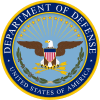Robert Wilkie: Difference between revisions
CutOffTies (talk | contribs) m →Controversy: clean |
|||
| Line 40: | Line 40: | ||
Wilkie gained attention for outlining guidelines that restricted congressional testimony to high-ranking officers and civilians appointed by President Bush. Several congressional officials accused Wilkie of preventing military's lower ranks to testify, which were more likely to give Congress an honest opinion opposed to higher ranks that sided with the administration.<ref name="bg_2007">{{cite news|url=http://www.boston.com/news/nation/washington/articles/2007/05/10/pentagon_restricting_testimony_in_congress/|title=Pentagon restricting testimony in Congress|last=Bender|first=Bryan|date=May 10, 2007|work=Boston Globe|accessdate=2009-09-24}}</ref> |
Wilkie gained attention for outlining guidelines that restricted congressional testimony to high-ranking officers and civilians appointed by President Bush. Several congressional officials accused Wilkie of preventing military's lower ranks to testify, which were more likely to give Congress an honest opinion opposed to higher ranks that sided with the administration.<ref name="bg_2007">{{cite news|url=http://www.boston.com/news/nation/washington/articles/2007/05/10/pentagon_restricting_testimony_in_congress/|title=Pentagon restricting testimony in Congress|last=Bender|first=Bryan|date=May 10, 2007|work=Boston Globe|accessdate=2009-09-24}}</ref> |
||
According to a [[Boston Globe]] article, both Democrats and Republicans in Congress saw this as a "blatant attempt to bog down investigations of the war". In addition, there was an argument that the Pentagon had no authority to set those rules.<ref name="bg_2007" /> |
According to a [[Boston Globe]] article, both Democrats and Republicans in Congress saw this as a "blatant attempt to bog down investigations of the war". In addition, there was an argument that the Pentagon had no authority to set those rules.<ref name="bg_2007" />The controversy involved one subcommittee and Wilkie argued on behalf of the Pentagon that the enlisted soldiers who were the target of the subcomittee's investigation had to be given the opportunity to avail themselves of counsel. Once there was a change in the subcommittee's leadership, the Pentagon reached an accomodation which gave the subcommittee access to the soldiers. |
||
== References == |
== References == |
||
Revision as of 17:13, 28 September 2009
Robert L. Wilkie | |
|---|---|
 | |
| Assistant Secretary of Defense for Legislative Affairs | |
| Assumed office September 30, 2006 | |
| President | George W. Bush |
| Vice President | Dick Cheney |
| Preceded by | Dan Stanley |
| Personal details | |
| Born | Fayettville, North Carolina |
| Political party | Republican |
| Profession | Lawyer |
Robert Leon Wilkie is an American lawyer who served as the Assistant Secretary of Defense for Legislative Affairs. An intelligence officer in the United States Naval Reserve, he was nominated for his current position by U.S. President George W. Bush on June 20, 2006 and his appointment was approved by the Senate on September 30, 2006.
Early life and education
Wilkie was born in Frankfurt West Germany, and attended Fayetteville North Carolina's Reid Ross Senior High School. As the son of an Army Artillery officer, he grew up in Fort Bragg, North Carolina. He received his bachelor's degree from the Wake Forest University in North Carolina. He went on to receive his law degree from Loyola University School of Law in New Orleans in 1988 and a Master of Laws in International and Comparative Law from Georgetown University Law Center in Washington, D.C..
Government career
Prior to being named assistant secretary, Wilkie served as special assistant to the President for national security affairs and a senior director of the National Security Council where he was a senior policy advisor to then-National Security Advisor Condoleezza Rice as well as her successor, Stephen Hadley. Mr. Wilkie developed strategic planning for the implementation of the Moscow Treaty, the Millennium Challenge Account, Iraqi Reconstruction and NATO Expansion.[1]
He began his professional career on Capitol Hill as Counsel to Jesse Helms, and later served as legislative director for Rep. David Funderburk of North Carolina. He was assigned to the Committee on International Relations and the Commission on Security and Cooperation in Europe. In 1997, he began service as counsel and advisor on international security affairs to Senate Majority Leader Trent Lott.
Controversy
Wilkie gained attention for outlining guidelines that restricted congressional testimony to high-ranking officers and civilians appointed by President Bush. Several congressional officials accused Wilkie of preventing military's lower ranks to testify, which were more likely to give Congress an honest opinion opposed to higher ranks that sided with the administration.[2]
According to a Boston Globe article, both Democrats and Republicans in Congress saw this as a "blatant attempt to bog down investigations of the war". In addition, there was an argument that the Pentagon had no authority to set those rules.[2]The controversy involved one subcommittee and Wilkie argued on behalf of the Pentagon that the enlisted soldiers who were the target of the subcomittee's investigation had to be given the opportunity to avail themselves of counsel. Once there was a change in the subcommittee's leadership, the Pentagon reached an accomodation which gave the subcommittee access to the soldiers.
References
- ^ OSD/LA Staff
- ^ a b Bender, Bryan (May 10, 2007). "Pentagon restricting testimony in Congress". Boston Globe. Retrieved 2009-09-24.
- DoD News Release"Wilkie Named Assistant Secretary of Defense for Legislative Affairs" United States Department of Defense, October 17, 2006.
- Mike Soraghan, "DoD braces for a fight with Pelosi", The Hill, June 2007.
External links
- Robert L. Wilkie, White House biography
- Robert L. Wilkie, Department of Defense biography

